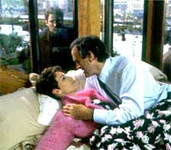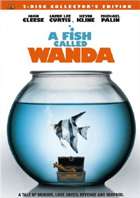A Fish Called Wanda [DVD]
|
 A Fish Called Wanda is the greatest Ealing Studios comedy never made at Ealing Studios. Bought by the BBC in 1959, after which it shifted entirely to television production, Ealing had its golden age in the 1950s when it produced a string of pitch-perfect pitch-black comedies, including The Ladykillers (1955) and The Lavender Hill Mob (1951). The best of these movies rooted their humor in a group of uniquely comedic personalities and the various clashes among them--call it the art of personal dissonance.
A Fish Called Wanda is the greatest Ealing Studios comedy never made at Ealing Studios. Bought by the BBC in 1959, after which it shifted entirely to television production, Ealing had its golden age in the 1950s when it produced a string of pitch-perfect pitch-black comedies, including The Ladykillers (1955) and The Lavender Hill Mob (1951). The best of these movies rooted their humor in a group of uniquely comedic personalities and the various clashes among them--call it the art of personal dissonance.
This, better than anything, describes the approach actor/writer John Cleese and cowriter/director Charles Crichton took with A Fish Called Wanda. As a London-set comedy about a jewel heist followed by numerous betrayals, set ups, and misunderstandings, it is a perfectly formulated farce that trades not only in personality clashes, but in cultural clashes, as well. The four main character are neatly split down the middle between Brits and Americans, and the ensuing chaos trades smartly and hilariously on both stiff-upper-lip British stereotypes and wanton, egotistical American stereotypes. The story begins with a plan hatched by humorless criminal mastermind George Thomason (Tom Georgeson) to steal $20 million in diamonds. His accomplice and lover, Wanda (Jamie Lee Curtis), is secretly plotting with her other lover, Otto (Kevin Kline), who is posing as her brother, to rip George off after the robbery and leave him with the blame. Caught in the middle is poor, stuttering Ken (Michael Palin), an animal-rights softie who works as George's righthand man, but seems awkwardly out of place among all these scheming criminals. The robbery goes as planned, but not Wanda and Otto's double-cross. This necessitates Wanda seducing George's barrister, a well-meaning middle-age dork named Archie Leach (John Cleese), whose tedious life is dominated by his officious and shrill wife (Maria Aitken) and whiny daughter (Cynthia Cleese). Thus, it's hard to blame Archie when he immediately falls for Wanda, who is pretending to be an eyelash-batting legal student fascinated by his lawyerly experience. A funny thing starts to happen, though: As Wanda gets deeper into her charade, there are signs that she might actually be falling for Archie, as well. The heartless con artist in her is trumped by Archie's complete lack of guile. Describing the plot, though, gets nowhere close to the heart of what makes A Fish Called Wanda so memorably funny. Rather, the film's genius lies in its quartet of lead performances, each of which plays brilliantly off the other. The stand-out is Kevin Kline's Otto, a performance for which he was awarded a richly deserved Oscar (one of the few Oscars given out in recent years to a comedic performance). As a philosophy-spouting, self-preening lunkhead, Kline nails the foreign perception of Americans as loud-mouthed boors who are incapable of appreciating anything they can't claim as their own. Constantly berating the English for "getting rigor mortis in the prime of life," Otto is utterly blind to his own intellectual and cultural incompetence (the one thing he can't stand is being called "stupid," although it's the best adjective to describe him), which is pointed out to him in the movie's deliriously funny high point by Wanda, who informs him of his many, many mistakes (including his belief that the London Underground is a political movement). When called an ape, he smugly replies, "Apes don't read philosophy," to which Wanda provides the perfect response: "Yes, they do, Otto, they just don't understand it." Not surprisingly, Otto clashes with every character on screen. Because Wanda is trying to seduce Archie for information, Otto is forced to the teetering edge of a jealous rage, even though he professes not to "believe in jealousy." He constantly follows Wanda when she meets with Archie, always against her wishes. This leads to another of the movie's comic high points--a farcical scene in which Otto attempts to convince Archie's wife that he's a CIA agent informing everyone in the neighborhood about the debriefing of a KGB agent in a nearby safehouse. Kline and Aitken play the scene to the hilt, with her sharp rationality cutting right into his misguided self-righteousness. While all this is going on, Ken is left in a subplot in which he must take out an elderly woman (Patricia Hayes) who can identify George as the robber. However, Ken fails over and over again, killing not the woman, but instead her precious Yorkies, which rips at his animal-loving heart. The gag is not just in the blackly comedic visuals of toy dogs being snatched by foaming Doberman Pinsers or being squashed beneath giant crates, but also in the underlying jab at the movies' tendency to wring more sympathy out of their animal than human characters. A Fish Called Wanda was helmed by Charles Crichton, who had been a mainstay of the British cinema since the 1930s, but hadn't directed a feature film in nearly two decades. A veteran of Ealing Studios (he had directed 1951's The Lavender Hill Mob), he brought just the kind of professionalism and sturdy visual panache needed to set the stage for the gifted cast's antics (which were largely directed by Cleese). Crichton's style is never intrusive, and he realizes that the gold is in the various clashes between the characters, whether it be Otto's pretending to be gay to keep Ken from discovering the true nature of his relationship with Wanda or Wanda's increasing infuriation with Otto's stupidity. A Fish Called Wanda is a black comedy at heart, but it's also a black comedy with a heart, and I can tell you from experience that it just keeps getting better and better with each viewing.
Copyright ©2006 James Kendrick Thoughts? E-mail James Kendrick All images copyright © MGM Home Entertainment | |||||||||||||||||||||||||||||||||||||
Overall Rating:



 (3.5)
(3.5)
Subscribe and Follow
Get a daily dose of Africa Leader news through our daily email, its complimentary and keeps you fully up to date with world and business news as well.
News RELEASES
Publish news of your business, community or sports group, personnel appointments, major event and more by submitting a news release to Africa Leader.
More Information
